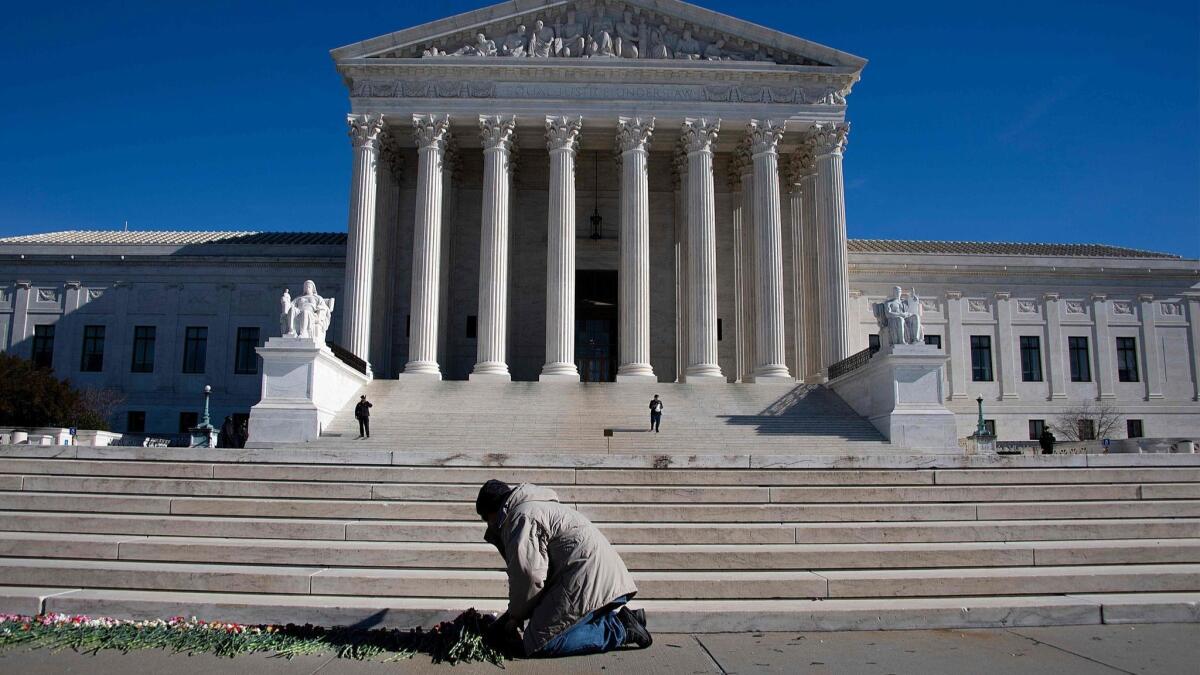Conservative states enact abortion bans in hope of overturning Roe vs. Wade
- Share via
Reporting from Atlanta — When Republican lawmakers in Alabama weighed a stringent new bill that would outlaw almost all abortions, they did not pretend that it complied with federal law or that it would go into effect anytime soon.
“Yes, it’s unconstitutional,” state House Rep. Terri Collins, the bill’s sponsor, said last week at a hearing. “All our pro-life bills are unconstitutional right now. That’s the goal.”
For years, conservatives in Southern and Midwestern states have been passing laws that restrict women’s access to abortion: mandating women wait as long as 72 hours for the procedure after receiving counseling, banning widely used surgical abortion methods, limiting state Medicaid programs from covering most abortions.
Now they are pursuing a more extreme legal strategy. Emboldened by the rightward tilt of the U.S. Supreme Court, states are passing more severe restrictions and near-total bans in a deliberate attempt to trigger a lawsuit that could push the Supreme Court to overturn its landmark 1973 Roe vs. Wade decision, which recognized a woman’s constitutional right to abortion.
Last week, Georgia followed Kentucky, Mississippi and Ohio to become the fourth state this year to outlaw abortion once a fetal “heartbeat” is detected, typically at around six weeks — before most women know they are pregnant.
Georgia’s new law gives a fetus — an embryo smaller than a coffee bean that has not developed a brain or organs that allow it to survive outside the womb — the status of “a class of living, distinct persons” that deserves “full legal recognition.”
Alabama, meanwhile, is on the verge of passing another strict abortion law, the Alabama Human Life Protection Act, which would ban abortion from the moment of conception. Any doctor who terminates a pregnancy in any circumstance, other than to save a woman’s life, could face up to 99 years in prison.
“We’ve never seen states passing near-total abortion bans,” said Elizabeth Nash, senior state issues manager at the Guttmacher Institute, a nonprofit research group that supports abortion rights. “This is new and different.”
Legislators in red states have become more willing to experiment, in part because they think there’s a greater chance an abortion ban could be upheld now that the Supreme Court has a solid conservative majority after President Trump’s appointment of Justices Neil M. Gorsuch and Brett M. Kavanaugh.
They also calculate that in an era of intense political and cultural partisanship, rolling back abortion rights will carry less of a political penalty.
“There’s more of a sense in some states that you can energize antiabortion voters and prevail at the polls by passing these laws even if a lot of other people might find them to be too extreme,” said Mary Ziegler, a professor of law at Florida State University and author of “Beyond Abortion: Roe v. Wade and the Battle for Privacy.”
At the same time, lawmakers in a growing number of Democratic-controlled states are clamoring to shore up abortion rights. Last week, Vermont passed a bill that would enshrine a right to “personal reproductive autonomy” in the state constitution.
In January, New York passed the Reproductive Health Act, which affirmed a “fundamental right” to abortion, allowed licensed professionals other than doctors to perform the procedures, and expanded access to abortions after the 24th week of pregnancy if “necessary to protect the patient’s life or health.”
Even as legislators pass ever more extreme state laws, abortion remains legal across the United States. All the severe abortion bans violate Roe — which prevents states from restricting abortion before the fetus is viable, usually at about 23 or 24 weeks of pregnancy — and are likely to be subject to long, drawn-out legal challenges.

On Friday, a federal judge struck down Kentucky’s six-week ban.
U.S. District Judge Joseph H. McKinley Jr. ruled the law was unconstitutional — that it would create a “substantial obstacle” to a woman’s right to an abortion. Kentucky Gov. Matt Bevin, a Republican, vowed to appeal.
For the architects of the new abortion bans, the ultimate goal is to get the Supreme Court to look at the moral question of when human life begins.
“There’s a conversation that has to take place,” said state Rep. Rich Wingo, a Republican who worked with the Alabama Pro-Life Coalition to draft the Alabama bill.
“We all know Roe says that an unborn child is not a person, thus it’s not protected by the Constitution of the United States,” Wingo said. “But in 1973, there wasn’t 3-D or 4-D imaging; there wasn’t fetal monitoring; the ultrasound was somewhat archaic.
“The bottom line is we believe that life begins at conception, we believe that there is life in the womb, and we have evidence of that from these new technologies,” he added.
Many advocates for women’s reproductive rights see the issue of fetal personhood as a red herring.
“Even if the fetus or embryo is a person in the full legal and moral sense, it does not follow that it has the right to use another’s body for its development,” said Laurie Shrage, a professor of philosophy at Florida International University.
“Drawing the line between permissible and impermissible abortions involves balancing a number of important interests and rights — especially a woman’s reproductive autonomy versus preserving a fetal human life,” she added. “There is no perfect way to draw this line.”
Unlike the Bible-thumping sermons of past decades, many abortion opponents in conservative Southern states talk of how medical science and technology allow for more understanding of human development in its earliest stages.
They also use the language of equal rights.
The Alabama bill, for example, frames the rights of the fetus as an issue of human equality — a natural step from the principle that “all men are created equal” and a continuation of movements against slavery and even for women’s suffrage.
“Abortion advocates speak to women’s rights,” the bill states, “but they ignore the unborn child, while medical science has increasingly recognized the humanity of the unborn child.”
Many who uphold abortion rights contend that such complex moral questions cannot be solved by politicians.
“This question about when life begins is a deeply personal belief,” said Staci Fox, president and chief executive of Planned Parenthood Southeast.
“For some, it’s based on religion. For some, it’s based on science. These issues are really between women and their families and their faith and their doctors, not between them and their politicians,” she said.
Across the United States, a majority of Americans generally support abortion in the early stages of pregnancy.
While 6 in 10 Americans say abortion “should generally be legal” during the first three months, according to a 2018 Gallup poll, support for abortion dwindles to 28% for the second trimester and 13% for the third trimester.
Legal experts on both sides of the debate agree that the Supreme Court is likely to move slowly.
“It’s going to be difficult for the Supreme Court to make an outright reversal of Roe,” said Randall Marshall, executive director of the American Civil Liberties Union of Alabama, which has vowed to challenge the state’s bill if it passes.
“If the court were suddenly to reverse the last 40-plus years of its cases, then it looks less like an independent judicial branch than the political arm of whoever’s in power,” he said. “I think the court is concerned for its very legitimacy.”
Critics of the abortion bans complain that the race to be the first to challenge Roe vs. Wade is a waste of millions of taxpayer dollars that could be used to address cash-strapped schools, children’s healthcare programs, rural hospitals and prisons.
Politicians who advocate for the life of fetuses, though, say they are following the morally righteous path, no matter the financial costs or legal challenges.
“Our job is to do what is right, not what is easy,” Georgia Gov. Brian Kemp, a Republican, said at a signing ceremony Tuesday at the Georgia State Capitol in Atlanta. “We are called to be strong and courageous, and we will not back down. We will always continue to fight for life.”
In signing the law, Kemp fulfilled a campaign promise to his conservative base, but it is still a risky political strategy in an increasingly diversifying state where Republican power is slowly receding and Democrats have become competitive.
Even in the South, public opinion on abortion varies by state. While 59% of Alabama voters supported a constitutional amendment last year declaring it state policy to recognize and support the rights of fetuses, support is more tepid in Georgia. A recent poll suggested that 49% of Georgians oppose the six-week ban and 44% support it.
While the Georgia law makes exceptions for some cases of rape or incest, the sponsors of the Alabama law make an exception only for preventing a serious health risk to the mother.
Exempting abortions in cases of rape or incest, they argue, creates a knotty question for the Supreme Court: Is it OK to end a pregnancy if the mother is a victim of rape or incest? Instead, they advocate presenting an outright ban to the Supreme Court and tweaking the finer details later.
Last week, the Alabama Senate dissolved into a chaotic shouting match when its leaders removed an amendment that would permit exemptions for rape or incest — without allowing for a full roll call vote that would show the public how each senator had voted.
Senators postponed the debate until Tuesday. Yet not even the bill’s opponents doubted that it would ultimately be signed into law.
“I know you all are for this bill, and I know this bill is going to pass,” said Sen. Vivian Davis Figures, a Democrat, as she urged her Senate colleagues — more than three-quarters of them Republican men — to hold a full and transparent vote.
“You all are going to get your way,” she said, “but at least treat us fairly and do it the right way.”
More to Read
Sign up for Essential California
The most important California stories and recommendations in your inbox every morning.
You may occasionally receive promotional content from the Los Angeles Times.











